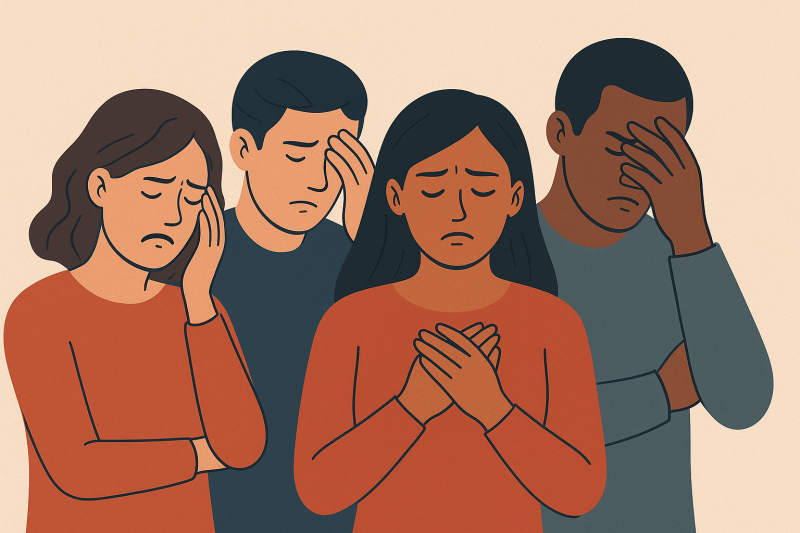

یکی از رویکردهای نوین در رواندرمانی، استفاده از «همدلی روایی» یا شناسایی با شخصیت داستانی است.
در این روش، از مراجع خواسته میشود تا ارتباط عاطفی با شخصیت اصلی یک داستان یا کتاب برقرار کند. با این فرآیند، فرد از طریق بررسی زخمها، چالشها و مسیر بهبود شخصیت، احساسات و تجربههای خود را بازتاب میدهد و شناخت عمیقتری از خود پیدا میکند.
در این زمینه، کتاب «خاطرات سرد» (Cold Memories) پایهای قدرتمند برای چنین کار درمانی فراهم میکند.
این کتاب داستان دردهای ناگفته، سکوت درونی و جستجوی تدریجی معنا را روایت میکند — سفری که بسیاری از خوانندگان میتوانند با آن ارتباط عاطفی عمیق برقرار کنند.
One of the modern approaches in psychotherapy is the use of “narrative empathy” or character-based identification.
In this method, the client is encouraged to emotionally connect with the main character of a story or book. Through this process, they reflect on their own emotions and experiences by exploring the character’s wounds, challenges, and path to healing.
In this context, the book “Cold Memories” offers a powerful foundation for such therapeutic work.
It tells a story of unspoken pain, internal silence, and the gradual search for meaning — a journey many readers may deeply relate to.
📖 To learn more about the book, please follow the link below:
(25) About novel Cold memories | LinkedIn

مقدمه
تروما یا آسیب اجتماعی پدیدهای روانی و جمعی است که زمانی رخ میدهد که یک جامعه یا گروه بزرگی از مردم در معرض رویداد یا مجموعهای از رویدادهای آسیبزا قرار میگیرند که احساس امنیت و هویت اجتماعی آنان را تهدید میکند.
این نوع تروما میتواند در اثر جنگ، دیکتاتوری، سرکوب سیاسی، بلایای طبیعی یا بحرانهای بهداشتی شکل گیرد. در جوامعی که تحت حکومتهای استبدادی زندگی میکنند، این آسیبها شکل و ویژگیهای خاصی به خود میگیرند که در این نوشتار بررسی میشود.
تعریف تروما یا آسیب اجتماعی
تروما یا آسیب اجتماعی به عنوان واکنش روانی یک گروه یا جامعه به رویدادی آسیبزا تعریف میشود؛ رویدادی که امنیت و هویت جمعی را تهدید میکند.
این پدیده اغلب در نتیجهٔ جنگ، دیکتاتوری، سرکوب سیاسی، بلایای طبیعی یا بحرانهای اجتماعی و بهداشتی ایجاد میشود. در جوامع دیکتاتوری، آسیب اجتماعی ویژگیهای منحصربهفردی پیدا میکند (منبع: PMC).
ویژگیهای آسیب اجتماعی در جوامع دیکتاتوری
در نظامهای دیکتاتوری، آسیب اجتماعی معمولاً با موارد زیر همراه است:
-
ترس و بیاعتمادی: سرکوب سیاسی و نقض حقوق بشر باعث ایجاد ترس و بیاعتمادی متقابل میان مردم میشود.
-
سکوت و انکار: سانسور و سرکوب اطلاعات منجر به سکوت عمومی و انکار رویدادهای آسیبزا میگردد.
-
انتقال میاننسلی: آسیبهای اجتماعی میتوانند از نسلی به نسل دیگر منتقل شوند و اثرات روانی و رفتاری
Social Trauma: Collective Psychological Wounds and Their Consequences in Dictatorial Societies
Introduction
Social trauma, as a collective psychological phenomenon, occurs when a society or large group of people is exposed to a traumatic event or a series of events that threaten their sense of security and social identity. This type of collective trauma can stem from war, dictatorship, political repression, natural disasters, or public health crises. In societies under dictatorial rule, social trauma manifests in unique ways, which this article will examine.
Definition of Social Trauma
Social trauma is defined as the psychological reaction of a group or society to a traumatic event that threatens their security and social identity. It often arises from war, dictatorship, political repression, natural disasters, or crises. In societies under dictatorial control, social trauma exhibits distinct characteristics (PMC).
Characteristics of Social Trauma in Dictatorial Societies
In dictatorial societies, social trauma is associated with:
- Fear and distrust: Political repression and human rights violations generate fear and mutual distrust among people.
- Silence and denial: Censorship and suppression of information often lead to silence and denial regarding traumatic events.
- Intergenerational transmission: Social trauma can pass from one generation to the next, producing long-term psychological and behavioral effects (Crime & Justice Journal).
Consequences of Social Trauma
Social trauma has wide-ranging effects at both individual and collective levels:
- Individual psychological disorders: People may experience anxiety, depression, post-traumatic stress disorder (PTSD), and sleep disturbances.
- Weakening of social capital: Reduced social trust undermines cooperation and collective engagement.
- Unhealthy social relationships: Social trauma may foster unhealthy relationships, discrimination, and social violence.
- Intergenerational impact: Social trauma can persist across generations, affecting behavior and psychological health over time (SAGE Journals).
Strategies to Address Social Trauma
Effective strategies to mitigate social trauma include:
- Awareness and education: Raising public awareness and teaching coping skills can reduce the negative effects of trauma.
- Psychological support: Counseling and psychotherapy services help individuals heal and improve their mental well-being.
- Strengthening social capital: Creating safe spaces for dialogue and social interaction fosters trust and cooperation.
- Documentation and historical reconstruction: Recording traumatic events and rebuilding historical memory can support healing and prevent recurrence (IPA World).
Conclusion
Social trauma, particularly in societies under dictatorial rule, is a complex and multidimensional phenomenon that deeply affects both individual psychology and social structures. By identifying its characteristics, consequences, and interventions, societies can take effective steps to reduce its impact and support the processes of social healing and reconstruction.
https://www.linkedin.com/pulse/draft/preview/7376115257171144704